
9 minute read
Community and stakeholder engagement
End user and stakeholder engagement
In the spirit of MIRA’s co-design and design thinking approach to research, MIRA has leveraged the expertise of its End User and Stakeholder Committee (EUSC) members. The EUSC includes representatives from government, industry, and community partners. This group informs MIRA’s research priorities, provides researchers with an opportunity to share their work and build relationships with external stakeholders, and offers varied, multi-sectoral perspectives on the challenges, wants and needs of older adults.
Advertisement
MIRA's initiatives outlined in this report are a reflection of the activities MIRA engaged in to ensure input from stakeholders in all stages of research and program development. This has included the development of resources for end user engagement to be shared among the research community and creating interactive hubs for researchers and community stakeholders to promote collaborative interactions.
Intergenerational programming
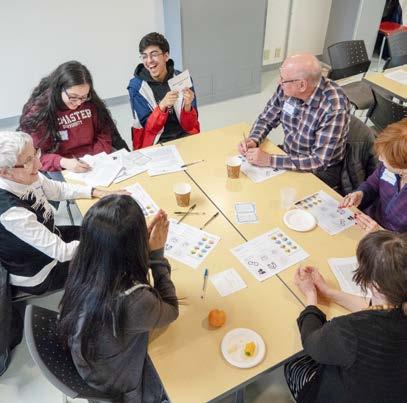
In 2017, a MIRA project team led by researcher Brenda Vrkljan (Rehabilitation Science) conducted a study on the establishment of an intergenerational hub on McMaster’s campus. These findings were published in Gerontology & Geriatrics Education. The paper, “Creating an Intergenerational University Hub: Engaging Older and Younger Users in the Shaping of Space and Place”, went on to win the Gerontological Society of America’s David A. Peterson Award in November 2020 honouring excellence in academic gerontology and/or geriatrics for an article.
Based on the findings of this study, which indicated a strong interest in intergenerational activities, MIRA partnered with McMaster’s Residence Life Services to offer intergenerational programming through a Living Learning Community in residence as a pilot program. Living Learning Communities bring together students who have self-identified an interest in living and learning in an integrated academic residential environment focused on a particular area of interest and participating in activities related to that shared interest. In 2019-2020, 28 students and 20 older adults enrolled in this social program and met monthly to spend time and engage in activities together.
Funding from the New Horizons for Seniors Program has allowed MIRA and McMaster’s Residence Life Services to expand this pilot program offering in 2020- 21, engaging more diverse older adults, a larger population of students living in residence, and students from the broader campus community. Due to the COVID-19 pandemic, plans for this program have been adapted to a virtual setting. ‘Meet My Hamilton’, a virtual intergenerational program, brings together 10 older adults and 20 undergraduate students, with the goal of helping first year students feel like part of the McMaster Community and of keeping older adults connected to their community. These sessions are facilitated by eight conversation partners from the Health, Aging and Society practicum program, who run sessions and design programming and activities. MIRA received additional funding from New Horizons for Seniors to transition this programming to a virtual setting and to develop a toolkit for running online programming with older adults.
E-learning for older adults
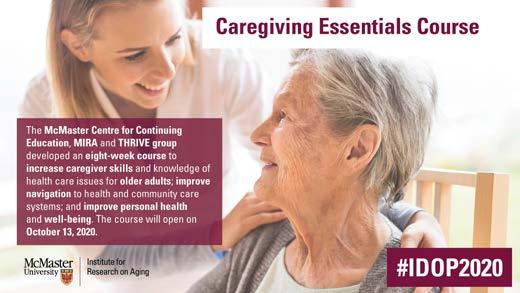
In 2020, MIRA facilitated a partnership between MIRA researchers, the Department of eLearning and Innovation (DELI) in the Faculty of Health Sciences, and the McMaster Optimal Aging Portal. This partnership aims to leverage the information available on the Portal and share it in new and engaging formats. Through this partnership, DELI has created two e-learning modules that are now housed on the Portal on exercise and osteoarthritis, and brain health. A third module on walking and mobility will be released in early 2021. More than 35,000 users have accessed the osteoarthritis and exercise module since March, and more than 40,000 users have accessed the e-learning module on brain health since its release in July. These resources have provided the community with a new way to engage with research that can support their mobility as they age.
McMaster as an Age-Friendly University
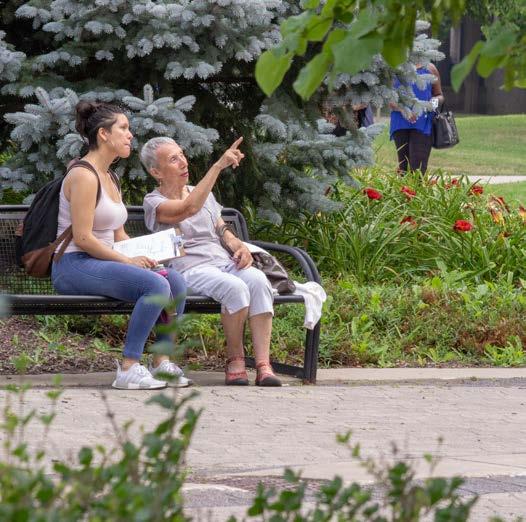
Since 2017, McMaster University has belonged to the international Age-Friendly University (AFU) network, a global body made up of higher education institutions that are committed to being more accessible to older adults. Launched in 2012 by Dublin City University (DCU) in Ireland, the AFU network builds on the World Health Organization’s Age-Friendly Communities Initiative, which encourages all communities to shape their physical and social environments to support people of all ages.
In 2018, MIRA undertook several studies to understand the alignment of McMaster University’s existing facilities and programs with the 10 principles of an AFU. Through this research, MIRA identified three key areas through which McMaster University could improve its alignment with AFU principles and continue developing the campus into a welcoming and inclusive space for people of all ages:
1. Communications and outreach: Ensuring members of the public are made aware of relevant events on campus, including research on aging and aging-specific programming; making online information accessible and easy to find and navigate for the public, including older adults.
2. Accessibility and inclusion: Ensuring accessibility features on campus are installed and maintained; continue to develop the experience of first-time visitors to campus; communicating the value that older adults can contribute in society and the McMaster community.
3. Programming and engagement: Developing educational programming that appeals to older adults and allows this group to learn about McMaster’s diverse research strengths; creating new opportunities to bring older adults on campus; encouraging older adults to become or continue to be part of the McMaster community as a means to support the creation of new social networks and combat social isolation.
As a response to these studies, MIRA assembled a steering committee to act on these recommendations. The committee is comprised of 40 members from 30 different units within McMaster University including student, staff, alumni and community service units, as well as representatives from other aging platforms at McMaster, the McMaster University Retirees Association, the AgeFriendly Hamilton Committee, and MIRA’s Trainee Network.
Since the emergence of COVID-19 in 2020, the committee has been working to adapt programming for online audiences and new mediums. Members are transitioning their programs online while offering support to make it easier to access online programming and learning opportunities; developing new programming that is taking advantage of opportunities created by virtual events; participating in research on COVID-19 and aging; and examining ways to continue to engage older adults in our research process. As such, our new priorities are to:
1. Bridge the digital divide by supporting online information accessibility for community members of all ages;
2. Develop an information hub to ensure members of the public are able to quickly and easily learn about McMaster University and opportunities that are available to them;
3. Continue to serve as a supportive community of practice, sharing ideas and programming to stay connected to and engaged with older adults.
Dixon Hall: An exciting new partnership
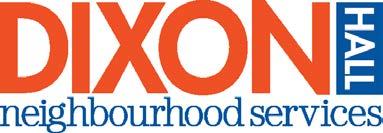
MIRA has developed a partnership with Toronto’s Dixon Hall, a multiservice agency that focuses on issues of poverty, social injustices and isolation. The agency is collaborating with the Labargefunded intergenerational and life course program of research (InHamilton; Dr. Andrea Gonzalez; 2018 Catalyst Grant). In response to COVID-19, this program has pivoted to collect measures examining the impact of COVID-19 on the physical and mental health of individuals. Discussions to form MIRA’s newest centre in Toronto in partnership with Dixon Hall are currently underway. Dixon Hall is well established and celebrated for its commitment to comprehensive client care to support Toronto’s most vulnerable, including low-income, homeless, and precariously housed older adults. The proposed centre, MIRA | Dixon Hall Centre, would be nested within MIRA to extend and expand on MIRA’s reach, and that of the McMaster Optimal Aging Portal, while targeting populations of citizens for whom mobility work can have positive outcomes. The aim of this collaboration is to improve quality of life and enable older adults to live with dignity through purposeful initiatives planned over the short- and long-term.
The MIRA | Collaborative for Health & Aging
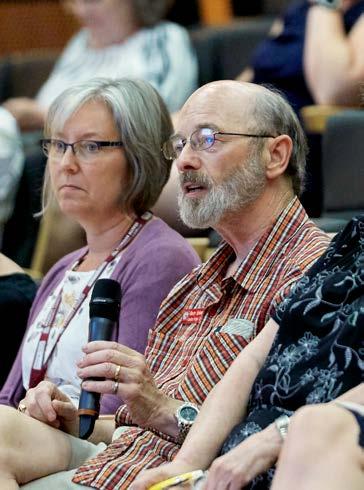
The McMaster Institute for Research on Aging | Collaborative for Health & Aging was established in 2019 by Parminder Raina (MIRA) and Maureen Markle-Reid (ACHRU) with the aim of supporting research on aging and building capacity in patient-oriented research on aging. The Collaborative provides consultation and support to researchers and knowledge users and facilitates important and meaningful connections between diverse stakeholders to enhance research and improve the health and well-being of older adults. Its five focus areas support Canada’s Strategy for PatientOriented Research (SPOR) core functions (e.g., data platforms, methods, knowledge translation), and forms the basis of its governance structure:
1. Advance the science of patient engagement to ensure representation of patient needs, perspectives, and aspirations at all levels of health care decision-making.
2. Support the implementation, evaluation, scale and spread of integrated, patient-centred innovations.
3. Support access to key data holdings, coordinate the linkage between the Canadian Longitudinal Study on Aging (CLSA) and Institute of Clinical Evaluative Sciences (IC/ES) data and create frameworks to share relevant data in a timely manner to diverse users.
4. Promote collaborations and partnerships which facilitates, connects and integrates activities across the province, that engages patients, researchers, health professionals, policy-makers and other health system stakeholders, and builds capacity for Ontario to champion evidence- and value-informed decisions for health care improvements.
5. Create, enhance, and develop the capacity of stakeholders (e.g., patients, caregivers, researchers, trainees, health professionals, policy makers) to engage in patient-oriented research.
Research impact
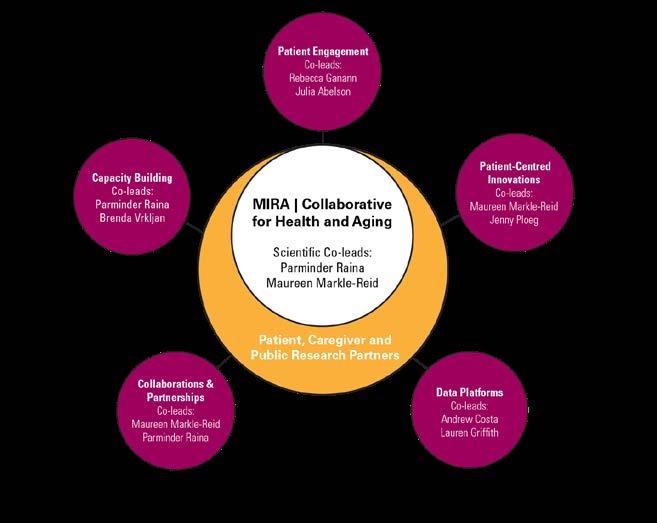
Since 2019, the Collaborative has made key achievements in each of its five focus areas. The Collaborative continues to successfully build capacity in research on aging and patient-oriented research on aging by:
1. developing and disseminating resources (46 social media campaigns, one newly created website, one systematic review, two plain language publications, two online educational materials, two technical reports),
2. invited presentations at conferences/ symposia and offering webinars (20 presentations/webinars), and
3. hosting its first annual knowledge transfer and exchange meeting.
The Collaborative’s publications describe best practices for partnering with older adults and will synthesize the evidence on implementation strategies and impacts of patient engagement. The Collaborative is developing a four-part online learning module series on designing, implementing, evaluating, and scaling up patient-oriented health interventions. The Collaborative developed and launched a new website which will feature older adult partners of the Collaborative and Knowledge Translation (KT) activities, including a new webinar series that highlights research at McMaster on aging, patient engagement, and current issues impacting older adults, such as COVID-19 and long-term care.
Annual knowledge transfer and exchange meeting
Meeting objectives were achieved during the first annual knowledge transfer and exchange meeting, which involved the Collaborative’s provincial partnership network including the Ontario SPOR Support Units (OSSU), Ministry of Health (MOH), IC/ES, Ontario Health Teams (OHTs), and SPOR Networks. These objectives were to:
1. Share the Collaborative’s values, strengths and activities with key stakeholders;
2. Identify capacity to support and build partnerships;
3. Determine alignment with the Canadian Institutes of Health Research (CIHR) – Strategy for Patient- Oriented Research 2.0 funding application;
4. Develop future directions of the Collaborative that align with the priorities of CIHR, OSSU, the OHTs and MOH.
In the area of data platforms, together with Canadian Longitudinal Study on Aging (CLSA) and the Institute of Clinical Evaluative Sciences (IC/ES) stakeholders, the Collaborative developed a detailed plan to link the CLSA to 15 data holdings at IC/ES. The Collaborative supported 33 consultations and outreach to SPOR-funded entities (e.g., Diabetes Action Canada) and diverse stakeholders (e.g., Mosaic Home Care, CorHealth, Juravinski) and strategically engaged more than 50 of its members from the disciplines of Health Services, Rehabilitation, Health Economics, Medicine, Nursing, Policy, Aging, Pharmacy, and Primary Care.










